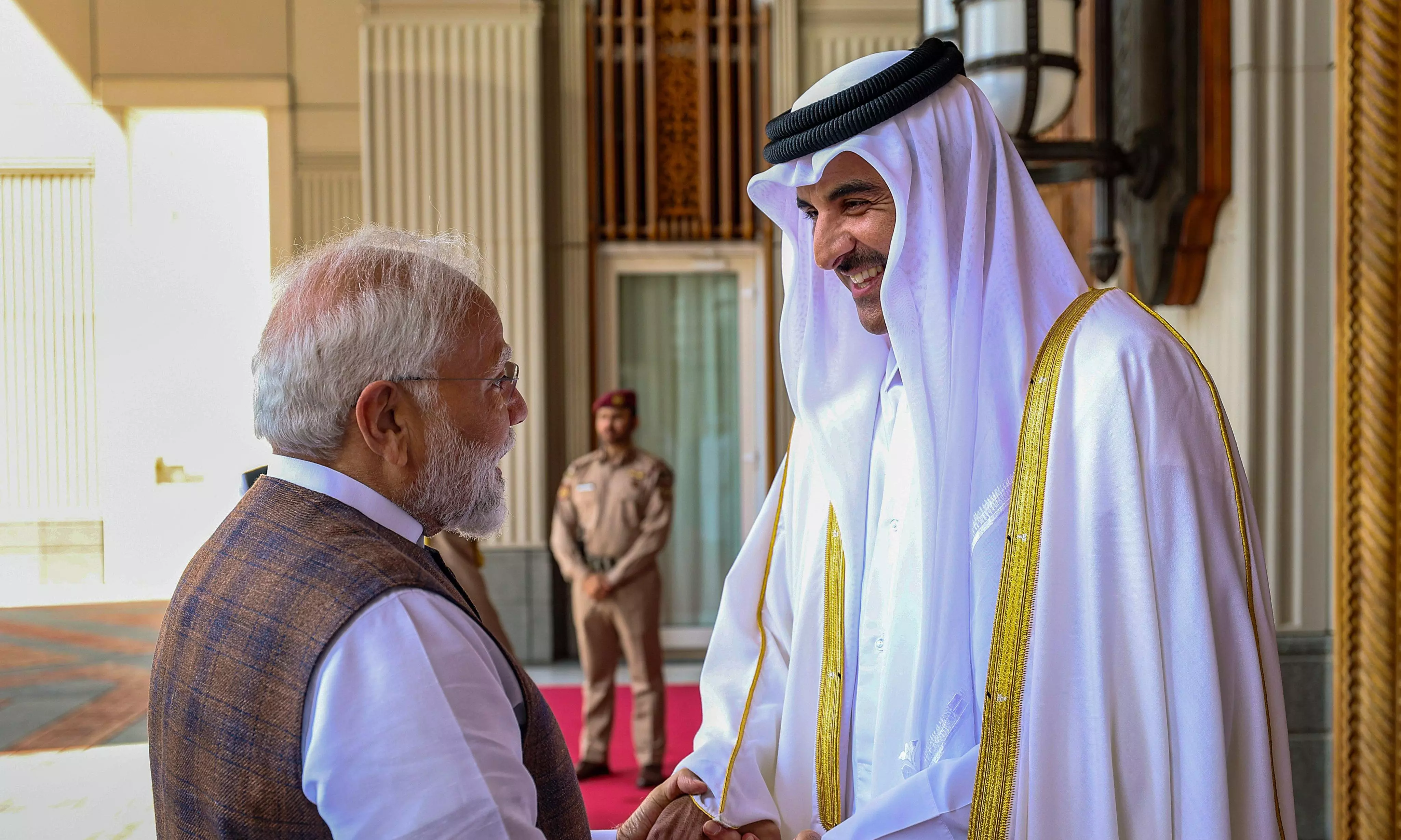
- Home
- India
- World
- Premium
- THE FEDERAL SPECIAL
- Analysis
- States
- Perspective
- Videos
- Sports
- Education
- Entertainment
- Elections
- Features
- Health
- Business
- Series
- In memoriam: Sheikh Mujibur Rahman
- Bishnoi's Men
- NEET TANGLE
- Economy Series
- Earth Day
- Kashmir’s Frozen Turbulence
- India@75
- The legend of Ramjanmabhoomi
- Liberalisation@30
- How to tame a dragon
- Celebrating biodiversity
- Farm Matters
- 50 days of solitude
- Bringing Migrants Home
- Budget 2020
- Jharkhand Votes
- The Federal Investigates
- The Federal Impact
- Vanishing Sand
- Gandhi @ 150
- Andhra Today
- Field report
- Operation Gulmarg
- Pandemic @1 Mn in India
- The Federal Year-End
- The Zero Year
- Science
- Brand studio
- Newsletter
- Elections 2024
- Events
- Home
- IndiaIndia
- World
- Analysis
- StatesStates
- PerspectivePerspective
- VideosVideos
- Sports
- Education
- Entertainment
- ElectionsElections
- Features
- Health
- BusinessBusiness
- Premium
- Loading...
Premium - Events

Qatar, which has emerged as a big player in the Middle East sans military power, has an keen eye on the burgeoning Indian market
Therelease of eight Indian Navy veterans accused of spying for Israel by Qatar had less to do with Prime Minister Narendra Modi's bonhomie with the Qatari Emir Sheikh Tamim bin Hamad Al Thani and more to do with the renewal of a lucrative LNG purchase deal for 20 years.
Life-saving deal
India’s largest gas importer, Petronet-LNG, and Qatar Energy signed on the sidelines of India Energy Week on February 5 an agreement extending the contract, which expires in 2028, for importing 7.5 million tonnes of LNG (liquefied natural gas) annually for an estimated $78 billion.
Energy experts say the deal is favourable to India and would help save $6 billion over 20 years.
Within a week of this deal, the eight Navy veterans were let off their prison sentences after a royal act of clemency, and brought back home.
They had faced death penalty that was commuted to prison sentence in October 2023, perhaps when Qatar became sure India would renew the deal after its expiry and not look for alternatives available elsewhere.
Gas imports
India meets 40 per cent of its gas needs through imports. The contract with QatarEnergy accounts for 35 per cent of total gas imports. Qatar began supplying LNG from 2003-2004 under the existing deal that is priced at a ‘slope’ (per cent) of 12.67 per cent of the current Brent crude futures rates and a fixed charge of 52 cents per unit (million British thermal units or mmBtu) of gas.
New Delhi bargained hard realising that Qatar, the world’s largest LNG exporter, was desperate for big buyers amid rising US supplies to Europe, limiting marketing options for its expanded liquefaction capacity, which will rise from 77 million tonne per annum to 126 million tonne by 2027.
Qatar’s sordid diplomacy
Over the years, tiny Qatar (285 times smaller than India) has clearly punched far above its weight by its zero-compunction aggressive no-holds- barred diplomacy , housing huge US military bases but also offices of Islamist terror groups like Taliban and Hamas . It has created an unenviable track record in high level hostage negotiations to peace parleys, all the while with an eye on the diplomatic high table.
It is located between Shia-dominated Iran and ‘Sunni’ Saudi Arabia – the two nations that bitterly compete for control of the Middle East – and shares a major oil and gas field with Iran and its only land border is with Saudi Arabia.
Besides hosting Hamas and Taliban offices, Qatar has been funding the Muslim Brotherhood, which seeks regime change in Islamic countries with hereditary rule, maybe to buy peace for its own rulers.
Qatar also uses the Doha-based Al Jazeera as a force multiplier to magnify conflicts or give them the desired spin before it moves in as the peace broker.
Interestingly, the first video of the abducted French journalists Malbrunot and Chesnot in ISIS captivity was broadcast by Al Jazeera before they were finally released through Qatari mediation. Some say Qatar has occupied the big seat at the negotiating table because Washington is much too heavily dependent on it for a whole host of reasons.
Playing in all directions
Qatar houses America’s largest military base in the Middle East – after the US moved its Combat Air Operations Center from Prince Sultan Airbase in Saudi Arabia to Qatar’s Al Udeid airbase near Doha in 2003. Al Udeid hosts over 10,000 US troops, serves as the logistics and command base for the US Central Command (CENTCOM) and is critical to US military operations in the region.
But Qatar also hosts the office of Palestinian terrorist group Hamas that runs the administration in Gaza and the Afghan Taliban ran a political office in Doha for seven years since 2013, before they took over the reins of Afghanistan.
French journalists Malbrunot and Chesnot who authored the Qatar Papers after release from ISIS, observed that Qatar, through its high-profile, secretive Qatar Charity, was indirectly helping finance Islamist groups that themselves are involved in hostage-taking but then release captives after Qatari mediation. Malbrunot called out the classic double game in which Qatar uses both conflict and resolution to gain influence and position in an otherwise volatile region. “That’s the double game, the grey zone,” Malbrunot told The New Yorker.
Relations with Arab neighbours
Qatar’s Arab neighbours – Saudi Arabia, the UAE, Bahrain and Egypt – saw through the double game and cut ties with it in 2017.
Among the 13 demands that they presented to Qatar to lift their embargo included curbing diplomatic ties with Iran, severing all ties with terrorist organisations like the Muslim Brotherhood and Hezbollah, and shutting down Al Jazeera and its affiliate stations.
Qatar started Al Jazeera TV channel in 1996 to beef up its political muscle and use it as force multiplier for its murky diplomacy.
Other than Al Jazeera, Qatar tried to ride the Muslim Brotherhood wave in Egypt, until it was removed from power and outlawed in 2013.
The four Arab countries alleged that Qatar was trying to meddle in their internal affairs through proxies like the Muslim Brotherhood.
After a 43-month embargo, the Arab neighbours restored ties with Qatar in 2021.
Doha's soft power
Using its massive wealth, Qatar tried augment its soft power by getting to host the World Cup in 2022 , edging out the US, South Korea, Japan, and Australia in a bidding process marred by bribery allegations.
Qatar Papers, the book by French journalists Malbrunot and Chesnot documents how Qatar was funding the Muslim Brotherhood, considered a terrorist outfit by its Arab neighbours, and a project of 140 mosques, Islamic schools and centres across Europe.
So clearly Qatar has been hunting with the hounds and swimming with the crocodiles which so far has allowed it to emerge as a big player in Middle East, despite lack of military power. If it has done Modi a favour by handing over the naval veterans which the Indian prime minister will surely capitalise in the run-up to the polls, it is with an eye on the Indian market and its technical manpower, its burgeoning middle class with rising personal disposable incomes and the investment opportunities it provides. It has much less to do with Modi and more to do with India.
The author is a former BBC and Reuters correspondent and author of five books on South Asian conflicts . He has been a fellow at Oxford snd Frankfurt Universities and ar East-West Centre, Washington.
(The Federal seeks to present views and opinions from all sides of the spectrum. The information, ideas or opinions in the articles are of the author and do not necessarily reflect the views of The Federal.)


